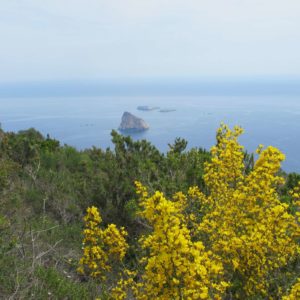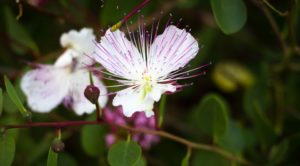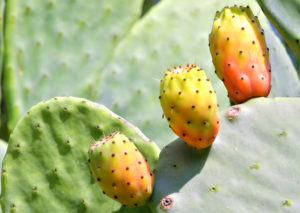The fortunate combination of a hot but temperate climate and a reasonably frequent rainfall has allowed numerous species of medicinal plants to flourish.

Growing spontaneously are several different types of Groom (in particular Spartium junceum L.), a bush without thorns with smooth, supple stems and scented yellow flowers. It flowers in late spring and at the beginning of the summer. In the past popular Sicilian medicine used the lye of broom ash for bathing the hands and feet to protect them from chilblains and swellings considered to be caused by a blood stoppage.

The Caper (capparis spinosa) is a beautiful plant with soft branches which radiate outwards from a single stem. It is native to the Mediterranean basin, although it also grows in the east. Capers, which are used in rice salads, are not the fruit, as one might think, but the buds of the flowers. The real fruit is an oval pod, called cucunciu in local dialect. It can be preserved in vinegar, with excellent results, if picked when very young.
The particular manner of epizoic dissemination of the caper explains why bushes are found in the most unlikely places. When the pod of the cucunciu is ripe and opens up, lizards drink the liquid in which the caper seeds are immersed, and these remain attached to their body. When the lizard returns to its nest in the cracks of the walls, it unwittingly sows the seeds of the caper.
In the past, capers were used to treat a widespread disease which caused temperatures and itching of the spleen. Using a marble mortar and wooden pestle, the bark from the root of the wild caper would be ground together with that of the walnut tree. The paste obtained would be placed on the spleen of the sick person in the morning and wrapped in bandages. The operation would be repeated daily for three weeks, until the temperature had disappeared.

Opuntia (Genus opuntia ), a type of prickly pear, has a flat trunk and spiky leaves. Its fruit is egg-shaped and varies from yellow to red. The prickly pear, although almost a symbol of the landscape is, in actual fact, a south-American tropical plant that became naturalised and widespread throughout the Mediterranean basin. It flowers in late spring and in summer. Both flowers and fruit are used. The fruit, picked at the end of the summer, is generally only eaten fresh, although it makes a fine jam and an exquisite mostarda (a type of candied fruit in hot mustard syrup).
The flowers are picked in summer, then are dried in the shade and kept in hermetic containers away from the light. The active principles contained in them are: sugars, plant stimulants, glutaminic acid, citric acid, malic acid, oxalic acid and vitamin C. Once, an infusion of the leaves was used as a natural remedy for acidity and heartburn.
Lipari ferry schedules
Routes and times updated in real time and refer to the current week.
From April to October, routes run much more frequently. We suggest you double-check the schedule a few days before your departure!
Service handled by Ok-ferry.com
Hotels, B&Bs, and Villas on Lipari
Book online for immediate confirmation. 12.000+ hotel rooms booked through booking.com
Booking.com
© ALL RIGHTS RESERVED





